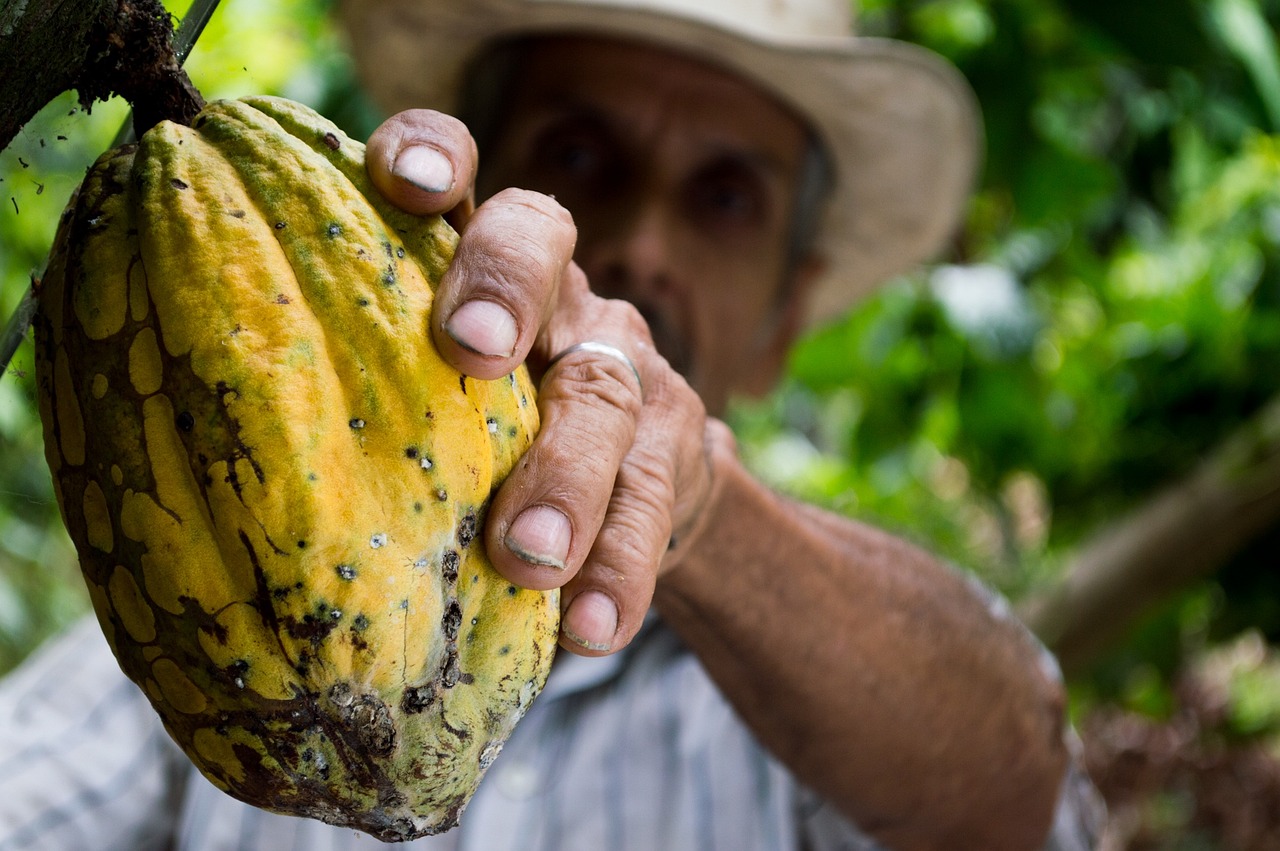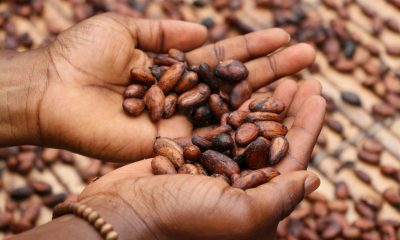Africa
Why the Cocoa Industry in Ghana Is on the Verge of Bankruptcy
In an apparently paradoxical way, the cocoa industry crisis is unleashed at a time when the prices of this raw material are at record levels on international markets. In London a ton of cocoa costs almost 3,500 pounds, the highest price since 1989. In New York a ton of beans costs around $4,000, close to the record of the last 45 years. The reasons behind this increase lie in the lack of supply.

The cocoa industry in Ghana is shaking. The Cocoa Board (Cocobod) – the institution that deals with the marketing of the country’s cocoa – no longer has money to pay the farmers. All this despite cocoa prices being at record levels on international markets.
Until now, Cocobod obtained the funds to buy and resell the seeds from a consortium of international banks at affordable rates. Today, however, the situation has changed. The economic crisis that has been hitting the country since 2022, the most serious in recent decades, has led banks to tighten financing conditions. The cocoa industry lacks the money to stay on its feet.
Read more about the struggling cocoa industry in Ghana and find the latest economic news of the day with our companion app Born2Invest.
How the cocoa industrycrisis began in Ghana
After Ivory Coast, Ghana it is the second largest cocoa producer in the world. The two countries, together, represent approximately 60% of the world’s production of cocoa beans. Unlike Côte d’Ivoire, however, where the Conseil Café Cacao simply supervises sales volumes and prices, in Ghana farmers are legally obliged to sell the seeds exclusively to Cocobod a> for the 2023/2024 harvest, but Parliament has yet to approve it. $400 million, the entity that then resells them to multinationals. The latter, however, is no longer able to pay the farmers.
The discontent among parliamentarians regarding the institution’s performance could block the financing. The Cocoa Board has been loss-making for six years. It is feared that, no longer able to legally sell their cocoa, Ghanaian farmers will resort to smuggling to the Ivory Coast, where it is easier to find buyers . The failure of this sector could have disastrous consequences on the country’s economy. In fact, cocoa represents 15% of Ghana’s exports. This would also lead to the loss of foreign currency, necessary to stabilize the local currency, the cedi, whose value has fallen to historic lows.
Cocoa prices are skyrocketing
In an apparently paradoxical way, this crisis is unleashed at a time when the prices of this raw material are at record levels on international markets . In London a ton of cocoa costs almost 3,500 pounds, the highest price since 1989. In New York a ton of beans costs around 4,000 dollars, close to the record of the last 45 years. The reasons behind this increase lie in the lack of supply, with 2023 production well below expectations.
This is due to the meteorological phenomenon El Niño, responsible for the warming of the surface waters of the Pacific, which has upset the climate of the entire planet . Previously in Ivory Coast and Ghana the climate was too dry and prevented the growth of the fruit. Then it became too humid, favoring the appearance of diseases in the plantations. Drought linked to El Niño also contributed to worsening cocoa production in West Africa.
The economic crisis in Ghana and the intervention of the International Monetary Fund
The crisis in the cocoa industry completes an economic picture that is worrying to say the least. Since Ghana stood out as a virtuous example of economic performance in 2019, things have changed. If previously the discovery of offshore oil deposits, and the consequent extraction agreements with multinationals such as Eni, had brought the country onto the international scene, now Ghana is experiencing the hardest economic crisis in recent decades. At the beginning of 2022 inflation rose by 54%. The value of the local currency – the cedi – has collapsed by more than 50%. Public finances are bleeding. More than half of the country’s revenue – 70% – is absorbed by debt servicing.
In January, Ghana missed interest payments on its debt and the government had to ask the International Monetary Fund (IMF) for help . The bailout program envisages $3 billion over three years. Like any loan, the one granted by the IMF also has conditions. The government of Ghana will have to increase its revenues while reducing expenses.
“This means that taxes are likely to rise, as will the price of water, electricity and fuel,” Professor Godfred Bokpin of the university told the BBC of Ghana. New taxes on cigarettes, drinks, alcohol and wine have already been introduced, as well as an increase in income tax. Citizens were told that the crisis was caused by the Covid-19 pandemic and the war in Ukraine. However, many believe that the cause also lies in the mismanagement of the economy by the government.
The protests against the administration of Nana Akufo-Addo
The president of Ghana, Nana Akufo-Addo – elected in 2017 and reconfirmed 4 years later – has maintained for years that the country could do it alone. Under the motto “Ghana Beyond aid” it had, in fact, abandoned international aid programs in 2019. During the second mandate, however, the government was unable to realize the promises made to the citizens, due to the costs that these would have entailed for the State. Among these, for example, the $2.5 million per year for the training of teachers and nurses. Or even the measure that suspended water and electricity bills during the three weeks of lockdown ($9.4 million).
In recent months numerous anti-government protests have animated the capital Accra. After a series of strikes called by the national workers’ union, the Trade Union Congress, the executive gave in and signed an agreement to increase the 30% salary. Akufo-Addo also backtracked on the proposal to use pension funds for the public debt overhaul program. Another idea that the union has railed against.
__
(Featured image by eliasfalla via Pixabay)
DISCLAIMER: This article was written by a third party contributor and does not reflect the opinion of Born2Invest, its management, staff or its associates. Please review our disclaimer for more information.
This article may include forward-looking statements. These forward-looking statements generally are identified by the words “believe,” “project,” “estimate,” “become,” “plan,” “will,” and similar expressions. These forward-looking statements involve known and unknown risks as well as uncertainties, including those discussed in the following cautionary statements and elsewhere in this article and on this site. Although the Company may believe that its expectations are based on reasonable assumptions, the actual results that the Company may achieve may differ materially from any forward-looking statements, which reflect the opinions of the management of the Company only as of the date hereof. Additionally, please make sure to read these important disclosures.
First published in valori. A third-party contributor translated and adapted the article from the original. In case of discrepancy, the original will prevail.
Although we made reasonable efforts to provide accurate translations, some parts may be incorrect. Born2Invest assumes no responsibility for errors, omissions or ambiguities in the translations provided on this website. Any person or entity relying on translated content does so at their own risk. Born2Invest is not responsible for losses caused by such reliance on the accuracy or reliability of translated information. If you wish to report an error or inaccuracy in the translation, we encourage you to contact us.

-

 Impact Investing6 days ago
Impact Investing6 days agoThe Sustainability Revolution: Driving a Net-Zero, Nature-Positive Economy
-

 Biotech2 weeks ago
Biotech2 weeks agoNew Molecular Clues Explain Aggressive Neuroblastoma and Point to Targeted Treatments
-

 Business4 days ago
Business4 days agoTopRanked.io Weekly Affiliate Digest: What’s Hot in Affiliate Marketing [EKSA Affiliate Program Review]
-

 Fintech2 weeks ago
Fintech2 weeks agoSwissHacks 2026 to Launch Inaugural Swiss FinTech Week in Zurich

























